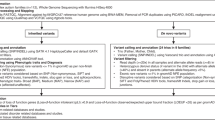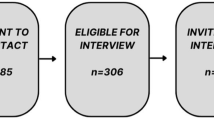Abstract
This study aimed to characterize the nuanced perspectives expressed by Autistic adults about genetic testing for autism. In this secondary analysis of an existing dataset, we used inductive content analysis of free-text responses that Autistic adults wrote in response to questions asking about perceptions of genetic testing for autism that had been included in a previous survey. Participants who completed the survey had been recruited online. Three-hundred eighty-nine participants wrote a total of 28,774 words in response to the questions of interest. While some respondents wrote about potential benefits of genetic testing (79/389), more (333/389) wrote about potential negative outcomes of genetic testing. Participants wrote about concerns of eugenics (281/389), described a lack of trust in how genetics information would be used (125/389), and raised concerns that genetic testing could increase discrimination (66/389). This is the largest study to date to conduct an in-depth analysis of Autistic adults’ opinions on genetic testing for autism. Most respondents raised serious concerns. Additional work is needed to collect more Autistic opinions about genetic testing for autism.
This is a preview of subscription content, access via your institution
Access options
Subscribe to this journal
Receive 12 print issues and online access
$259.00 per year
only $21.58 per issue
Buy this article
- Purchase on SpringerLink
- Instant access to full article PDF
Prices may be subject to local taxes which are calculated during checkout

Similar content being viewed by others
Data availability
Data are available from the corresponding author on reasonable request.
Code availability
The data generated and analysed during this study are available from the corresponding author on reasonable request.
References
Lai M-C, Lombardo MV, Baron-Cohen S. Autism. Lancet. 2014;383:896–910.
Griesi-Oliveira K, Sertié AL. Autism spectrum disorders: an updated guide for genetic counseling. Eeinstein (São Paulo). 2017;15:233–8.
Schaefer GB, Mendelsohn NJ, Professional Practice and Guidelines Committee. Clinical genetics evaluation in identifying the etiology of autism spectrum disorders: 2013 guideline revisions. Genet Med. 2013;15:399–407.
Stravropoulos J, Shago M. CCMG guidelines for genomic microarray testing. Canadian College of Medical Genetics. 2016. [Link: https://www.ccmg-ccgm.org/wp-content/uploads/2022/04/CCMG_Guidelines_for_Genomic_Microarray_Testing_FINAL.pdf].
Harris HK, Sideridis GD, Barbaresi WJ, Harstad E. Pathogenic yield of genetic testing in autism spectrum disorder. Pediatrics. 2020;146:e20193211.
Klitzman R, Bezborodko E, Chung WK, Appelbaum PS. Views of genetic testing for autism among autism self-advocates: a qualitative study. AJOB Empirical Bioethics. 0, 1–18.
Gallion T, Williams ZJ, Niarchou M, Duncan L, Hooker G, Taylor KA, et al. Attitudes of autistic adults toward genetic testing for autism. J Genet Couns. 2024 https://doi.org/10.1002/jgc4.1918.
Byres L, Morris E, Austin J. Exploring Autistic adults’ perspectives on genetic testing for autism. Genet Med. 2023;25:100021.
Ellis RM, Asbury K. An investigation of autistic opinions about autism-related genomic research. Neurodiversity. 2024;2:27546330241287317.
Middleton A, Hewison J, Mueller RF. Attitudes of deaf adults toward genetic testing for hereditary deafness. Am J Hum Genet. 1998;63:1175–80.
Boudreault P, Baldwin EE, Fox M, Dutton L, Tullis L, Linden J, et al. Deaf adults’ reasons for genetic testing depend on cultural affiliation: results from a prospective, longitudinal genetic counseling and testing study. J Deaf Stud Deaf Educ. 2010;15:209–27.
Martinez A, Linden J, Schimmenti LA, Palmer CGS. Attitudes of the broader hearing, deaf, and hard-of-hearing community toward genetic testing for deafness. Genet Med. 2003;5:106–12.
Mascia KL, Robin NH. Attitudes of deaf individuals towards genetic testing of genes known to cause hearing loss. Clin Ethics. 2023;18:230–5.
Taneja PR, Pandya A, Foley DL, Nicely LV, Arnos KS. Attitudes of deaf individuals towards genetic testing. Am J Med Genet Part A. 2004;130A:17–21.
Foltz, A & Shank, C. Deaf sign-language using patients’ experiences in health emergencies in wales: perspectives for improving interactions. Front. Commun. 2020 5.
Meador HE, Zazove P. Health care interactions with deaf culture. J Am Board Fam Med. 2005;18:218–22.
Emery S, Burke TB, Middleton A, Belk R, Turner G. Clause 14(4)(9) of embryo bill should be amended or deleted. BMJ. 2008;336:976.
Porter G, Smith MK. Preventing the selection of “deaf embryos” under the Human Fertilisation and Embryology Act 2008: problematizing disability? N. Genet Soc. 2013;32:171–89.
Zeidan J, Fombonne E, Scorah J, Ibrahim A, Durkin MS, Saxena S, et al. Global prevalence of autism: a systematic review update. Autism Res. 2022;15:778–90.
Warrier V, Greenberg DM, Weir E, Buckingham C, Smith P, Lai MC, et al. Elevated rates of autism, other neurodevelopmental and psychiatric diagnoses, and autistic traits in transgender and gender-diverse individuals. Nat Commun. 2020;11:3959.
Loomes R, Hull L, Mandy WPL. What is the male-to-female ratio in autism spectrum disorder? a systematic review and meta-analysis. J Am Acad Child Adolesc Psychiatry. 2017;56:466–74.
Cuccaro ML, Czape K, Alessandri M, Lee J, Deppen AR, Bendik E, et al. Genetic Testing and corresponding services among individuals with autism spectrum disorder (ASD). Am J Med Genet A. 2014;164A:2592–600.
Acknowledgements
JA was supported by BC Mental Health and Substance Use Services. The authors offer gratitude to the Coast Salish Peoples, including the xʷməθkwəy̓əm (Musqueam), Skwxwú7mesh (Squamish), and Səl̓ílwətaʔ/Selilwitulh (Tsleil-Waututh) Nations, on whose traditional, unceded and ancestral territory we have the privilege of working. We acknowledge that our efforts in reconciliation and repatriation need to go far beyond land acknowledgements and we hold ourselves publicly accountable to learning and doing as much as we can to support efforts in returning the land to its rightful custodians. JA and LB thank the members of the Translational Genetics Research Collaborative for their varied support.
Funding
This research did not have funding support.
Author information
Authors and Affiliations
Contributions
All authors contributed to the intellectual design, the drafting, revision, and final approval of the manuscript.
Corresponding author
Ethics declarations
Competing interests
MH, LB, and JA declare that they have no conflicts of interest.
Ethical approval
This study was approved by the BC Children and Women’s Research Ethics Board (H21-01937). All participants provided informed consent.
Additional information
Publisher’s note Springer Nature remains neutral with regard to jurisdictional claims in published maps and institutional affiliations.
Rights and permissions
Springer Nature or its licensor (e.g. a society or other partner) holds exclusive rights to this article under a publishing agreement with the author(s) or other rightsholder(s); author self-archiving of the accepted manuscript version of this article is solely governed by the terms of such publishing agreement and applicable law.
About this article
Cite this article
Hendry, M., Byres, L. & Austin, J. Autistic perspectives on the moral and ethical considerations of genetic testing for autism. Eur J Hum Genet 33, 1316–1323 (2025). https://doi.org/10.1038/s41431-025-01862-5
Received:
Revised:
Accepted:
Published:
Issue date:
DOI: https://doi.org/10.1038/s41431-025-01862-5
This article is cited by
-
Uncertainty, ethics, and progress in genomic medicine
European Journal of Human Genetics (2025)



